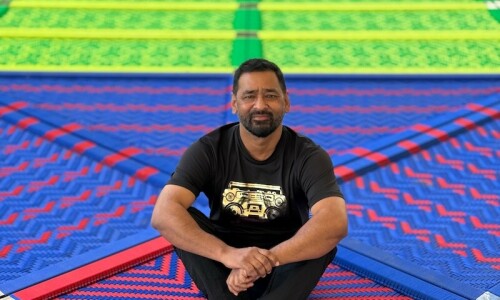ISLAMABAD: The Supreme Court on Tuesday suspended the declaration of the Lahore High Court, Rawalpindi bench, of holding as illegal the detention of retired Col Inamur Rahim.
“The operation of the Lahore High Court-Rawalpindi Bench is suspended for the time being,” observed Justice Mushir Alam who was heading a three-judge Supreme Court bench when Attorney General (AG) Anwar Mansoor revealed before the court that the accused was facing serious allegations of espionage.
The bench, also consisting of Justice Mazhar Alam Khan Miankhel and Justice Syed Mansoor Ali Shah, had taken up the federal government’s appeal against the Jan 9 short order in which the high court while hearing a habeas corpus petition of Husnain Inam, son of Mr Rahim, had declared the detention of the lawyer unlawful.
Mr Rahim was picked up by military authorities from his home in Rawalpindi on Dec 17, 2019 and since then he has not been produced before any court.
Justice Mushir Alam says court wants to ascertain nature of offences against accused
In its order, Justice Alam observed that the AG had produced before the court certain classified documents in a sealed envelope which showed that the respondent (Mr Rahim) was being interrogated under the Official Secrets Act, 1923, as well as offences under the Pakistan Army Act (PAA), 1952.
The court in its order also observed that it was expected the respondent would be treated in accordance with the law and that he would be provided access to legal assistance. It stated that the document suggested incriminating material against the accused on which he was being inquired upon. It is better to wait till the inquiry is finalised against the detained retired colonel — a lawyer known for pursuing missing persons’ cases, observed Justice Alam.
The court also asked Advocate Tariq Asad, who intervened on behalf of Mr Rahim, to furnish a concise statement before the court when the counsel cited the 1975 Saifud Saif case in which the Lahore High Court had held that civilians were not the subject matter under the PAA. But the judgement cited was not readily available with the counsel for which he sought some time.
Justice Shah, however, told the counsel that the hearing of the appeal would be taken up again after a week. But the court ignored a request made by Advocate Taufiq Asif that it should pass an order for production of the detained lawyer.
At the outset, Justice Alam inquired from the AG to explain the reasons behind the arrest of the lawyer who was later booked under serious offences. The court also made it clear that under the law it was mandatory to inform the reasons behind the arrest, Justice Alam observed, adding the court wanted to ascertain the nature of offences against the accused.
The AG, however, revealed that certain sensitive information relating to Pakistan’s nuclear assets, premier intelligence agency — Inter Services Intelligence (ISI) — as well as postings of some officers was retrieved from the laptop of Mr Rahim which was also transmitted. The AG, however, did not divulge further where the information was transferred though the first law officer said that he was ready to confide in the court everything provided the proceedings were held in-camera instead of the hearing in the open court.
At this Justice Shah wondered whether the detained lawyer presumably was a spy and involved in anti-state activities. The AG replied in the affirmative by stating that Mr Rahim was allegedly a foreign spy, adding the information retrieved from his laptop was of sensitive nature that violated the Official Secrets Act.
Moreover, Mr Rahim was not alone rather there was a complete network of spies since a number of other persons were also arrested and being charged, he added.
Referring to a query by the court as to how much time the probe will consume, the AG explained that he could not suggest at this stage how much time it would take to complete the initial inquiry against the accused but could only share with the court that under PAA procedures there were two stages.
Formal charge
In the first stage an inquiry was initiated against the accused while in the second stage formal Field General Court Martial proceedings were conducted during which formal charge was framed. After the inquiry is completed, Mr Rahim would be provided access to a counsel to defend himself against the allegations, the AG said.
The AG, however, conceded that allegations the detained lawyer was facing entail 14 years of rigorous imprisonment or death sentence could also be awarded depending upon the sensitivity of the allegations.
In the appeal, both the ministries of defence as well as interior had pleaded that the release of the detained person at this stage of investigation would amount to hampering the entire process of investigation involving heinous charges.
Moreover, the high court was approached through a habeas corpus petition, which become infructuous (invalid) the moment a disclosure was made before the high court that the accused was apprehended by military authorities under Section 2(1)(d) read with Sections 59 and 73 of the Pakistan Army Act and the Pakistan Army Rules as well as the Officials Secrets Act, 1923.
According to the appeal, the security of the state would be adversely affected if the law enforcement agencies are denied to arrest such accused who are allegedly involved in espionage activities against the state and are under investigation. But the high court overlooked the law that any person, including the retired army officer, if commits any offence under the Pakistan Army Act, 1952 and the Official Secrets Act, 1923 in relation to the affairs of armed forces, the person would be subject to the same act and can be arrested or detained for investigation, collection of evidence and trial if recommended in the matter.
Published in Dawn, January 15th, 2020
















































Dear visitor, the comments section is undergoing an overhaul and will return soon.